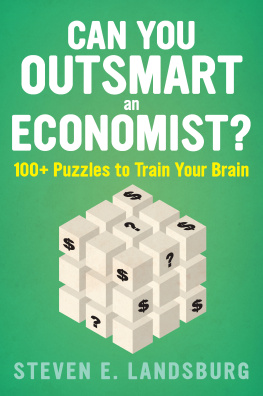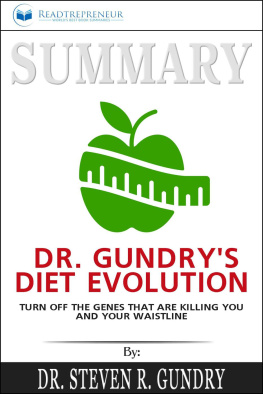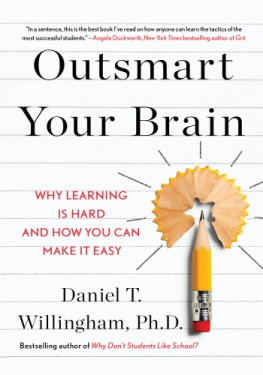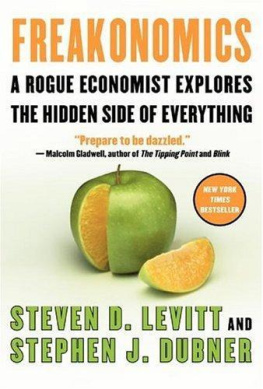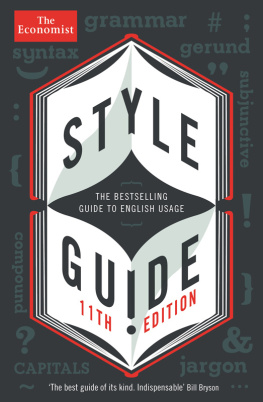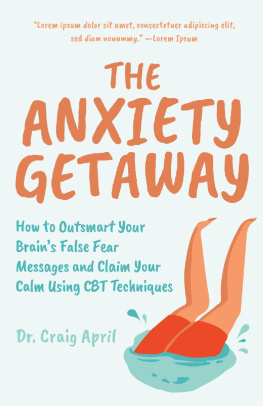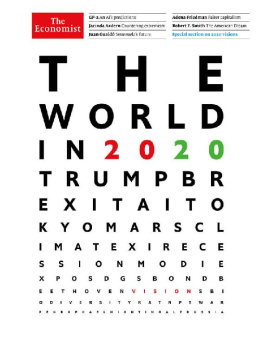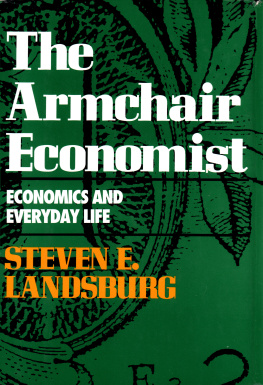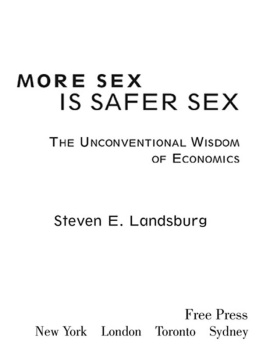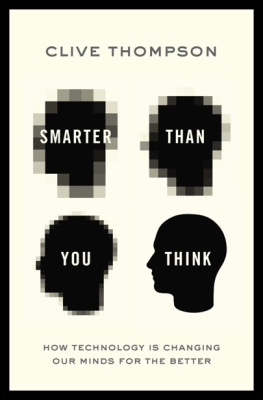Steven E Landsburg - Can You Outsmart an Economist
Here you can read online Steven E Landsburg - Can You Outsmart an Economist full text of the book (entire story) in english for free. Download pdf and epub, get meaning, cover and reviews about this ebook. year: 0, genre: Science. Description of the work, (preface) as well as reviews are available. Best literature library LitArk.com created for fans of good reading and offers a wide selection of genres:
Romance novel
Science fiction
Adventure
Detective
Science
History
Home and family
Prose
Art
Politics
Computer
Non-fiction
Religion
Business
Children
Humor
Choose a favorite category and find really read worthwhile books. Enjoy immersion in the world of imagination, feel the emotions of the characters or learn something new for yourself, make an fascinating discovery.
- Book:Can You Outsmart an Economist
- Author:
- Genre:
- Year:0
- Rating:4 / 5
- Favourites:Add to favourites
- Your mark:
- 80
- 1
- 2
- 3
- 4
- 5
Can You Outsmart an Economist: summary, description and annotation
We offer to read an annotation, description, summary or preface (depends on what the author of the book "Can You Outsmart an Economist" wrote himself). If you haven't found the necessary information about the book — write in the comments, we will try to find it.
Can You Outsmart an Economist — read online for free the complete book (whole text) full work
Below is the text of the book, divided by pages. System saving the place of the last page read, allows you to conveniently read the book "Can You Outsmart an Economist" online for free, without having to search again every time where you left off. Put a bookmark, and you can go to the page where you finished reading at any time.
Font size:
Interval:
Bookmark:
Copyright 2018 by Steven E. Landsburg
All rights reserved
For information about permission to reproduce selections from this book, write to or to Permissions, Houghton Mifflin Harcourt Publishing Company, 3 Park Avenue, 19th Floor, New York, New York 10016.
hmhco.com
Library of Congress Cataloging-in-Publication Data
Names: Landsburg, Steven E., 1954- author.
Title: Can you outsmart an economist? : 100+ puzzles to train your brain /Steven Landsburg.
Description: Boston : Mariner Books/Houghton Mifflin Harcourt, [2018] |
Identifiers: LCCN 2018006350 (print) | LCCN 2018028468 (ebook) | ISBN 9781328489821 (ebook) | ISBN 9781328489869 (trade paper)
Subjects: LCSH: EconomicsProblems, exercises, etc. | Puzzles. | Logic puzzles.
Classification: LCC HB171.5 (ebook) | LCC HB171.5 .L35143 2018 (print) | DDC 330dc23
LC record available at https://lccn.loc.gov/2018006350
Cover design by Mark R. Robinson
Cover image Getty Images
Author photograph courtesy of the author
v1.0818
IllustrationCredits
Figures and illustrations by Jesse Raymond: pages .
First: I am grateful to Alex Littlefield at Houghton Mifflin Harcourt for his enthusiasm, insight, and good-natured persistence in the face of my occasional failures to recognize his wisdom. I am equally grateful to Lisa Glover, whose deft management has allowed me to labor under the illusion that the production process is pretty much effortless. And I am grateful to Pilar Garcia-Brown for coordinating everything behind the scenes, and allowing me to believe that everything else is effortless too. Every one of these people has been absolutely terrific to work with.
And Margaret Wimberger is the best copyeditor ever.
Next: I am enormously indebted to Lisa Talpey, Ken Braithwaite, Bennett Haselton, Romans Pancs, and Ron Tansky for detailed and helpful comments, many of which improved the exposition and a few of which saved me from embarrassing myself in print.
I am indebted also to the many brilliant commenters who have shown up over the years to join the discussion on my blog at TheBigQuestions.com and to remind me that they like thinking about this stuff. I hope you do too.
This is a different sort of puzzle book. If you solve the puzzles in this bookor even if you just cheat and read the solutionsyoull learn a lot about economics, a lot about how to interpret statistics, and maybe a bit about law, math, science, and philosophy. As you might expect if youre familiar with some of those subjects, not every puzzle has a clear, unambiguous answer. But that doesnt mean that all answers are equally good, and the solutions will at least aim to sort out the best from the worst.
There is, though, one way this book is just like every other puzzle book: its meant to be fun. To that end, Ive scattered in a few puzzles that I think are especially fun, even when they have no deep lessons to teach.
Here and there Ive also indulged in some (occasionally rambling) commentary that I hope will make the lessons of the puzzles either clearer or more entertainingor, ideally, both.
If this book has a moral, it is this: think beyond the obvious. What seems obvious is often wrong. Thats both why puzzles are fun and why economics is important. Economics is, first and foremost, a collection of intellectual tools for seeing beyond the obvious.
When 46 percent of male applicants but only 30 percent of equally qualified female applicants are accepted to grad school, what can we infer? When a strong pig and a weak pig compete for food, what should we expect? If you impose a price ceiling on wheat, what will happen to the price of bread? Why do appliance manufacturers prohibit retailers from discounting their merchandise? Can a series of perfectly rational choices lead to inevitable bankruptcy? In each case, the obvious answer is wrong, and economists know why. When youve finished reading this book, so will you.
Economists are not the only explorers in the land beyond the obvious. Philosophers, psychologists, legal scholars, scientists, and statisticians map the same territory, each equipped with a different intellectual toolkit. It would be foolish to ignore their hard-won discoveries. Nineteenth-century Arctic explorers routinely died of such foolishness when, disregarding the freely offered wisdom of the natives, they refused to wear animal skins and therefore froze to death in woolen clothes issued by the Royal Navy. The navy, you see, trusted only ideas that came from people like themselves. Id prefer not to make the same mistake, even in a less deadly context. So while most of the puzzles in this book are designed to showcase the power of economics, I am delighted to share some of the limelight with the worthy insights of non-economists.
Anyway, even if I wanted to, it would be quite impossible to fence economics off from all other disciplines, because disciplines overlap. A handful of numbers can either reveal a deep and important truth or mislead us into accepting a dangerous falsehood. How do you tell the difference? Both economists and statisticians worry about that question. Is the answer part of economics or statistics? Its part of both. And when lawyers have to settle cases based on a handful of possibly deceptive facts, they face essentially the same set of issues. Are they practicing law, or are they practicing statistics or economics? Theyre practicing all three.
Thats not the only way economics overlaps with the law. Much of economics is about facing up to trade-offs. Is it better to have a bigger fire department or a cut in taxes? Is it better to have more cars or less pollution? Is it better to have a safer investment portfolio or one with more upside potential? Legal scholars face exactly the same sort of trade-offs when they ask questions like: Is it better to risk more false convictions (say, by loosening the rules of evidence) or to risk more false acquittals (by tightening those rules)? When they debate that trade-off, are they being lawyers or are they being economists? Theyre being both.
Much of economics is about what it means to be rational, and the extent to which human behavior is rational, and why anyone should care. In other words: How do people make decisions, how could they make better decisions, and would better decisions improve their lives? These are also central questions in philosophy. Indeed, theres a whole subject called decision theory, which draws on ideas from both economics and philosophyand statistics and mathematics, for that matter. Are decision theorists economists, or are they philosophers? Sometimes theyre one, sometimes theyre the other, and often theyre both.
And so on. The analysis of strategic behavior lies at the core of both economics and political science. Finding the right way to think about uncertainty is key to both economics and the branch of mathematics called probability theory (though philosophers and statisticians weigh in heavily here also). Its quite simply impossible to just do economics without simultaneously doing a whole lot of other things.
Now and then, when youre reading this book, you might be tempted to ask, But what has this got to do with economics? Please resist that temptation! If what youre reading has anything to do with interpreting data, or with strategic behavior, or with decision making, or with calculating probabilities, or with facing trade-offs, then it not only has something to do with economics, it is economics. If what youre reading has anything to do with thinking beyond the obvious, then economics has something to contribute.
This is not a textbook. A textbook on economics would have chapters on consumer behavior, profit maximization, supply and demand, market structures, and cost-benefit analysis. There are plenty of good textbooks out there, but this book is different. Its organized according to the sorts of questions that people (including economists) ask naturally, and the habits of thinking that economists (and others) have found useful.
Font size:
Interval:
Bookmark:
Similar books «Can You Outsmart an Economist»
Look at similar books to Can You Outsmart an Economist. We have selected literature similar in name and meaning in the hope of providing readers with more options to find new, interesting, not yet read works.
Discussion, reviews of the book Can You Outsmart an Economist and just readers' own opinions. Leave your comments, write what you think about the work, its meaning or the main characters. Specify what exactly you liked and what you didn't like, and why you think so.

